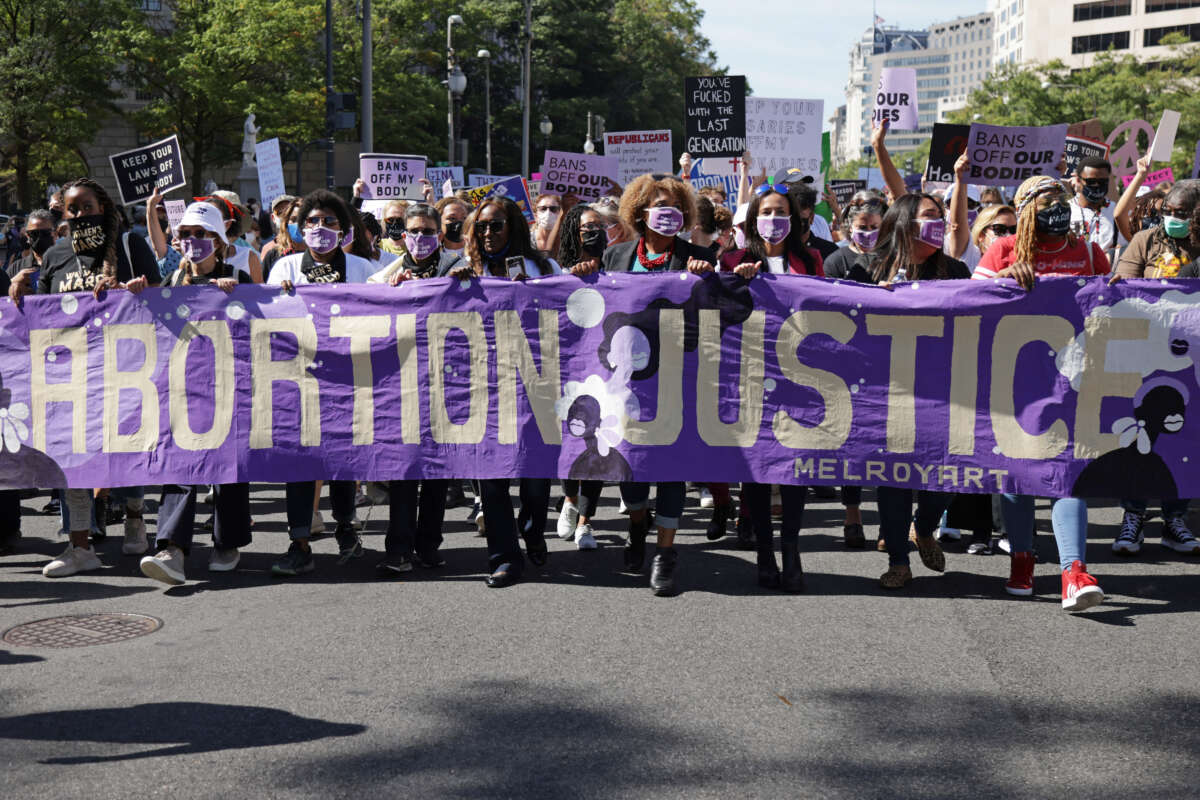Abortion rights activists are holding mass rallies across the country on Sunday to mark what would be the 50th anniversary of Roe v. Wade, the Supreme Courtruling that enshrined the constitutional right to abortion until right-wing justices struck it down last year. In Louisiana, one of at least 13 states that banned most abortions since the ruling, Nancy Davis will be a leader at the march in the state capital of Baton Rouge.
Davis, a Black woman and a mother, became an activist and catapulted into the national spotlight after surviving Louisiana’s ban on abortion. Shortly after the Supreme Court ruling, Davis learned that her pregnancy was unviable due to a rare disorder that left the fetus without a skull. Davis was forced to raise money online and travel to New York in order to have an abortion that doctors said was absolutely necessary but could run afoul of the vague language in Louisiana’s abortion ban.
Traumatized and in pain, Davis said she was left with no choice but to “carry to bury” the fetus until she could flee the state. Louisiana lawmakers are now considering exceptions to the abortion ban, including in cases of rape and incest. Gov. John Bel Edwards, an anti-abortion Democrat who supports limited exceptions, recently called implementation of the ban “relatively smooth” despite the fact that Davis and several others nearly died from pregnancy complications that require abortion care.
“Because the abortion ban wouldn’t allow [my doctors] to perform the abortion, and because of the vagueness of the exceptions written into the law, not only myself, but my entire family was left in a very, very traumatic situation,” Davis said in an interview with Truthout. “We were in a very dark place.”
The reality facing people living in the states that have banned abortion is heartbreaking. From 2015 to 2021, mothers living in states that have banned abortion were up to three times more likely to die during pregnancy, childbirth or shortly after childbirth, a clear sign of severe austerity over health care in red states, according to a new report from the Gender Equity Policy Institute.
Babies born in banned states were 30 percent more likely to die than those born in other states, and Black babies were more than twice as likely to die as white babies, according to the report. Thanks to widespread inequality, medical racism and underinvestment in health care, Black mothers were nearly three times as likely to die during pregnancy or childbirth as white mothers.
Monica Edwards, federal policy manager at Unite for Reproductive and Gender Equity (URGE), a youth-led racial and queer justice group, said these statistics reflect the nation’s long history of white supremacy and oppression of women and queer people.
“Look at the roots and remember and where our country started, and it started with racism, it started with slavery, with the displacing and murder of Indigenous folks,” Edwards said in an interview. “To really think about how we have multiple places in states in the South and Midwest where abortion is pretty much not available, and it starts with the fact that we have a long history of reproductive policies that coerced communities of color.”
Edwards, who organizes the Abortion Bans are Racist campaign with her colleagues, expects people of all genders and backgrounds to show up for the rallies on Sunday. Women are certainly leading the movement, but Edwards and URGE are inspired by the Black feminists who declared abortion and reproductive rights clearly intersectional issues that affect nearly everyone. This includes nonbinary and transgender people and their partners, who often engage in family planning and must have access to reproductive health care just like anyone else.
“The ongoing racism and white supremacy, and of course coercive reproductive policies, these disproportionately fall on Black folks and other people of color, and also fall on LGBTQ+ people,” said Edwards.
Indeed, about 70 percent of Black women live in states that ban or heavily restrict access to abortion care. Additionally, 25 percent of U.S. teenagers live in states that banned abortion after the Supreme Court ruling, according to the report.
Abortion rights intersect with a number of other progressive priorities that are under attack from the right, from comprehensive sex education in schools, to access to quality health care and education in general. However, House Republicans have pledged to slash federal spending on social welfare while recently voting for legislation that attacks reproductive rights. Last year, the vast majority of House Republicans quietly voted against a highly popular bill that would enshrine the right to access birth control and other methods of contraception.
“When you are talking about having access to contraception and having access to abortion or just heath care in general, these aren’t issues that are based on the ideas of a certain political party, they are issues that affect any person living in the country,” Edwards said.
Organizers with a broad coalition of reproductive justice groups say rallies for abortion rights will be held in all 50 states on January 22, and you can find nearest rally by clicking here.
“It’s very important for people to come out because we are all coming for a common goal — for reproductive freedom, for reproductive justice, and for women to have their right to choose,” Davis said.
Press freedom is under attack
As Trump cracks down on political speech, independent media is increasingly necessary.
Truthout produces reporting you won’t see in the mainstream: journalism from the frontlines of global conflict, interviews with grassroots movement leaders, high-quality legal analysis and more.
Our work is possible thanks to reader support. Help Truthout catalyze change and social justice — make a tax-deductible monthly or one-time donation today.
